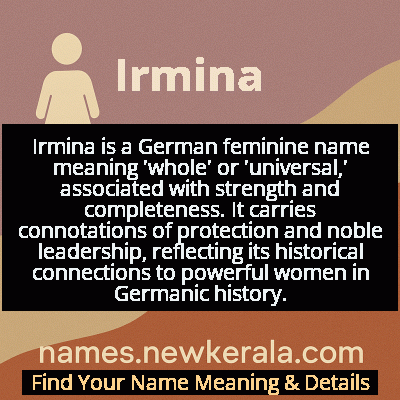Irmina Name Meaning & Details
Origin, Popularity, Numerology Analysis & Name Meaning of Irmina
Discover the origin, meaning, and cultural significance of the name IRMINA. Delve into its historical roots and explore the lasting impact it has had on communities and traditions.
Name
Irmina
Gender
Female
Origin
German
Lucky Number
1
Meaning of the Name - Irmina
Irmina is a German feminine name meaning 'whole' or 'universal,' associated with strength and completeness. It carries connotations of protection and noble leadership, reflecting its historical connections to powerful women in Germanic history.
Irmina - Complete Numerology Analysis
Your Numerology Number
Based on Pythagorean Numerology System
Ruling Planet
Sun
Positive Nature
Leaders, ambitious, highly driven, self-reliant, innovative.
Negative Traits
Overly aggressive, domineering, impatient, selfish.
Lucky Colours
Red, orange, gold.
Lucky Days
Sunday.
Lucky Stones
Ruby, garnet.
Harmony Numbers
2, 3, 9.
Best Suited Professions
Entrepreneurs, managers, engineers.
What People Like About You
Courage, determination, leadership.
Famous People Named Irmina
Saint Irmina of Oeren
Abbess and Saint
Founded monasteries and was daughter of King Dagobert II, known for her piety and charitable works
Irmina of Trier
Noblewoman
Co-founded the Benedictine monastery of Echternach with Saint Willibrord
Irmina Wokoeck
Historian
German historian specializing in medieval studies and women's religious communities
Name Variations & International Equivalents
Click on blue names to explore their detailed meanings. Gray names with will be available soon.
Cultural & Historical Significance
The name carries connotations of aristocratic lineage, religious devotion, and cultural preservation during the transition from pagan Germanic traditions to Christianity. Throughout medieval German history, the name remained associated with noble women who balanced spiritual piety with practical leadership, often serving as abbesses who managed large monastic estates and educational institutions. This historical significance gives the name a weight of tradition and cultural importance that extends beyond its literal meaning.
Extended Personality Analysis
Individuals named Irmina are typically perceived as strong-willed, principled, and deeply committed to their beliefs and responsibilities. They often possess a natural authority and organizational ability that makes them effective leaders, combined with a protective instinct toward those in their care. This combination of strength and nurturing creates a personality that is both formidable and compassionate.
Irminas tend to be traditional yet progressive, valuing heritage while recognizing the need for thoughtful change. They exhibit remarkable resilience in facing challenges and often serve as pillars of stability in their communities. Their decision-making is typically deliberate and well-considered, reflecting the wisdom and foresight associated with the name's historical bearers who navigated complex political and religious landscapes. The name suggests someone who commands respect through competence and integrity rather than aggression or dominance.
Modern Usage & Popularity
In contemporary times, Irmina remains a relatively rare but respected name in German-speaking countries, particularly among families with strong connections to regional history or Catholic traditions. While it never achieved widespread popularity like other German names, it maintains a steady presence as a distinctive choice that honors heritage without being overly common. The name has seen occasional revivals in recent decades as part of the broader trend toward traditional and historically significant names, though it remains outside the top 1000 names in most countries. Its usage reflects a preference for names that are both distinctive and meaningful rather than following current naming trends.
Symbolic & Spiritual Meanings
Symbolically, Irmina represents the convergence of strength and spirituality, embodying the Germanic ideal of protective leadership combined with deep moral conviction. The name carries connotations of cultural preservation and historical continuity, serving as a bridge between ancient Germanic traditions and Christian values. It symbolizes the strength found in devotion and the power of feminine leadership in maintaining cultural and spiritual traditions. The warrior goddess association, while not directly etymological, adds a layer of symbolic protection and strategic wisdom to the name's meaning, representing the guardian of tradition who adapts to changing times while preserving essential values.

